St Mary's Church, Woolton
St Mary's Church is in Church Road, Woolton, Liverpool, Merseyside, England. It is an active Roman Catholic parish church in the Pastoral Area of Woolton and Halewood, and the Archdiocese of Liverpool[1] The church is recorded in the National Heritage List for England as a designated Grade II listed building.[2]
| St Mary's Church, Woolton | |
|---|---|
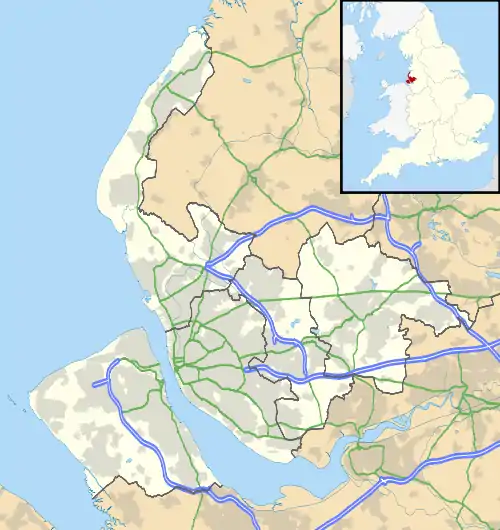 St Mary's Church, Woolton Location in Merseyside | |
| OS grid reference | SJ 422 868 |
| Location | Church Road, Woolton, Liverpool, Merseyside |
| Country | England |
| Denomination | Roman Catholic |
| Website | St Mary's, Woolton |
| History | |
| Status | Parish church |
| Architecture | |
| Functional status | Active |
| Heritage designation | Grade II |
| Designated | 19 June 1985 |
| Architect(s) | R. W. Hughes |
| Architectural type | Church |
| Style | Gothic Revival |
| Groundbreaking | 1859 |
| Completed | 1860 |
| Specifications | |
| Materials | Sandstone, slate roof |
| Administration | |
| Diocese | Archdiocese of Liverpool |
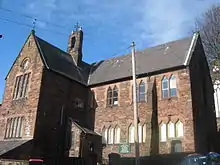
History
The church was built in 1859–60, and designed by R. W. Hughes, an architect from Preston.[3] It was opened on 28 October 1860. The church was re-decorated in 1981–82, and the font was moved to the front of the church.[4] The church's foundation stone was laid 11 September 1859. The Church was known as Saint Benet's until 1881 when it became known as Saint Mary's.
History of the Catholic Mission in Woolton
A Catholic Community has been present for over 300 years. It has been a very varied and interesting History. Notable dates include:
| Year | Event | |
| 1715 | Benedictine Chaplains to the Molyneux family at Woolton Hall. | |
| 1731 | The ‘Woolton Mission’ was founded at St. Benet's Priory in Watergate Lane.
Our Parish school – Much Woolton Catholic Primary now stands on this site. | |
| 1795 | The exiled Benedictine nuns of Cambrai, the future Stanbrook Abbey, moved into 43-47 Woolton Street and ran a girls' school until they moved away in 1808.[5] | |
| 1859 | The Foundation Stone of the present Church was laid and dedicated to the patronage of Saint Benet. | |
| 1860 | The Church was opened on 28 October | |
| 1861 | The Church was renamed Saint Mary's | |
| 1869 | The School building (now the Parish Centre) and the Presbytery were built. | |
| 1873 | The Cloisters were built, to join the Church and Presbytery. | |
| 1928 | The Benedictines departed St Mary's
The Mill Hill Fathers became rectors. | |
| 1931 | V. Rev. Dr. Charles Gelderd becomes the first secular Parish Priest of Saint Mary's. | |
| 1947 | V. Rev Cannon Edward Murphy is appointed Parish Priest and remains for the next 33 years. | |
| 1950 | Bishop Halsall celebrated the Mass of consecration in the Church on 8 September. | |
| 1980 | V. Rev. Mgr. John P. Mahony is appointed as Parish Priest | |
| 1981/2 | During the early 1980s The Church interior was extensively redecorated and the font was moved to its current position at the front of the church. | |
| 1982 | Saint Benet's Priory in Watergate Lane is demolished. | |
| 1984 | Saint Benet's Cemetery is closed to make way for the housing development ‘Priory Way’. Remains, tombstones, monuments and other memorials were transferred to the graveyard at Saint Mary's. | |
| 1987 | An ecumenical covenant is signed with the other churches in Woolton: St James’, St Peter's and the United Reformed Church pledging a cooperative witness of Christ's people. | |
| 1989 | V. Rev. Mgr. Peter W. Ryan appointed as Parish Priest. | |
| 1999 | Rev. Fr. Patrick O’Brien appointed as Parish Priest. | |
| 2011 | Following Fr. Pat's retirement Rev. Fr. Timothy J Buckley C.Ss.R. appointed Parish Priest.
The Redemptorist Community at Bishop Eton take Pastoral Responsibility for the Parish |
Priests who have served at Saint Mary's
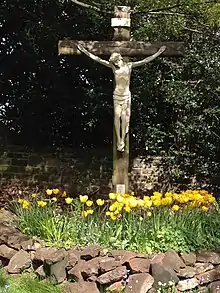
1862 – 1873 J.P. O’Brien OSB
1873 – 1880 P. Whittle OSB
1880 – 1891 W.Bede Prest OSB
1891 – 1894 H.G. Murphies OSB
1895 – 1896 J.W. Richards OSB
1896 – 1897 C.J. Fitzgerald OSB
1897 – 1909 Ambrose.A. Pereria OSB
1909 A.F. Fleming OSB
1909 – 1913 Vincent Corney OSB
1913 – 1919 H.M.Campbell OSB
1919 – 1928 J.M. Kelly OSB
1928 E.D. Fennell OSB
Assistant priests during the above years
B.M.Sutter OSB, A.J.McEvoy OSB, T.L.Almond OSB, Vincent Corney OSB, H.W.McKay OSB, P. O’Callaghan OSB, J.R.Riley OSB, J.G. Dolan OSB, C de Neubourg OSB, J.R. Rylance OSB, L.S.Cave OSB, E.D.Fennell OSB, R.V.Gilbertson OSB, J.M.Kelly OSB, F.A.Harrington OSB, T.P. Worsley-Warwick OSB
In 1928 the Benedictines then departed after two centuries of service
| Mill Hill Fathers become Rectors | |
| 1928 – 1930 Fr. Herman Drontman
1930 – 1931 Fr. Martin Onsten |
Assistant: Fr. William Ross |
The first secular priest Fr. Charles Gelderd was appointed by Archbishop Richard Downey in 1931.
| Parish Priests | Assistant Priests (Residents) and Permanent Deacons | ||
| 1931 – 1947 | V.Rev. Dr. Charles Gelderd | 1932 – 35 | Fr Brendan Chapman |
| 1935 – 40 | Fr Francis Clayton | ||
| 1939 | Fr John P. Mahony | ||
| 1940 – 43 | Fr Edward Crowley
Fr Patrick Neligan | ||
| 1943 – 48 | Fr Stanley Baker | ||
| 1943 | Fr Finian O’Connor | ||
| 1945 | Fr Cyril Pilson | ||
| 1947 – 1980 | V. Rev. Cannon Edward Murphy | 1946 – 52 | Frs George Hickson & Francis Ripley |
| 1950 – 58 | Fr Patrick Higgins | ||
| 1952 | Fr Vincent Gaskell | ||
| 1957 – 59 | Fr Patrick Rose | ||
| 1958 – 61 | Fr Michael Gaine | ||
| 1960 – 66 | Fr James Collins | ||
| 1961 – 63 | Fr Peter Doyle | ||
| 1962 – 64 | Fr Gerald Willacy | ||
| 1963 – 65 | Fr Louis Hanlon | ||
| 1964 – 69 | Fr Joseph Howard | ||
| 1966 – 70 | Fr Bernard Bimson | ||
| 1969 – 71 | Fr Cyril Thomas | ||
| 1970 – 73 | Fr Kevin Ashton | ||
| 1971 – 73 | Fr Francis Goulbourne | ||
| 1974 – 75 | Fr Bernard Bimson | ||
| 1974 – 79 | Fr Christopher Crowley | ||
| 1977 – 84 | Fr James Lahiff | ||
| 1979 – 85 | Fr Brian Crane | ||
| 1980 – 1989 | V. Rev. Mgr. John P. Mahony | 1985 – 88 | Fr Robert Starkey |
| 1988 –1996 | Fr Thomas Wood | ||
| 1989 – 1999 | V. Rev. Mgr. Peter W. Ryan | 1997 - 2011 | Deacon Adrian Dickinson |
| 1999 - 2011 | Rev. Fr. Patrick O’Brien | ||
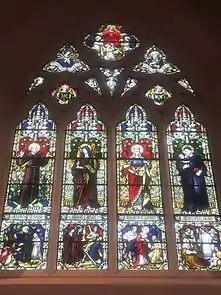
As Fr. Pat O’Brien's retirement approached, the Congregation of the Most Holy Redeemer better known as the Redemptorists were asked by Archbishop Patrick Kelly to take over the Pastoral Care of St. Mary's. This would be in addition to their parish of Our Lady of the Annunciation of Bishop Eton. The Parishes would not be merged but would continue to exist in their own right.
| Parish Priest | Assistant Priest | Permanent Deacon | |
| 2011 | Fr. Timothy J. Buckley C.Ss.R | Fr. Barrie O’Toole CSsR
Fr. Charles Randall CSsR |
Deacon Adrian Dickinson |
| 2012 | Deacon Bernard Rigby | ||
| 2017 |
Architecture
Exterior
St Mary's is constructed in red sandstone and has a slate roof. It is orientated with the ritual east facing the northwest.[lower-alpha 1] The plan consists of a five-bay nave with a north porch but without aisles, large north and south transepts, a chancel with north and south chapels and sacristies. There is no tower. At the west end are diagonal buttresses, an entrance, and pointed windows containing Geometric tracery.[2][3] The windows along the sides of the nave have two lights. In the south transept is a four-light window, and the north transept contains two two-light windows with a rose window above. In the chapel is a five-light window flanked by diagonal buttresses. The chapels are gabled with two-light windows. The south sacristy has one and two lights, with a rose window in the gable.[2]
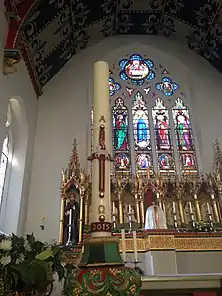
Interior
Inside the church, the high altar and reredos date from 1865, and were probably designed by E. W. Pugin. They were separated in 1948–50 by Weightman and Bullen, who placed the reredos against the east wall. The stained glass in the east window dates from 1878, and is a typical design by the Belgian stained glass painter Jean-Baptiste Capronnier.[3] The two-manual pipe organ was built by Franklin Lloyd in 1895, and is situated in a gallery on the north wall of the church at the west end.[6]
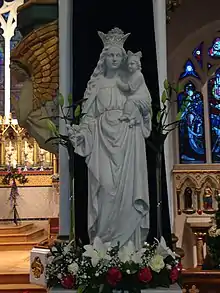
Associated buildings
Presbytery
The presbytery was built in 1864, and designed by E. W. Pugin. It is constructed in stone, and has a slate roof. The presbytery has two storeys and a front of three bays, the outer bays projecting under gables. In the centre bay is a gablet, and the third bay contains a single-storey canted bay window. The presbytery is connected on the left by a single-storey corridor with a central gabled entrance and a ridge dormer. It is designated as a Grade II listed building.[3][7]
School
The school was built in 1869, with its entrance in Mount Street. It is constructed in red sandstone with a slate roof. The school is in two storeys and has a nine-bay front, the central bay projecting forward under a gable. The windows in the ground floor have three lights under ogee heads; those in the upper floor have two lights under cusped heads. In the gable of the projecting wing is a rose window. The school is also listed at Grade II.[3][8] The school building is now used at the Parish Hall and the ground floor is a Nursery.
References and notes
Notes
- In the description of the church, the ritual orientation is used.
Citations
- Woolton and Halewood, Archdiocese of Liverpool, retrieved 22 October 2013
- Historic England, "Roman Catholic Church of Saint Mary, Liverpool (1280345)", National Heritage List for England, retrieved 22 October 2013
- Pollard, Richard; Pevsner, Nikolaus (2006), Lancashire: Liverpool and the South-West, The Buildings of England, New Haven and London: Yale University Press, pp. 507–508, ISBN 0-300-10910-5
- A Short History of Saint Mary's Woolton, St Mary's, Woolton, retrieved 22 October 2013
- "Nuns in Woolton". Retrieved 24 October 2020.
- "NPOR N00175", National Pipe Organ Register, British Institute of Organ Studies, retrieved 1 July 2020
- Historic England, "Presbytery of St. Mary's Church, Liverpool (1356302)", National Heritage List for England, retrieved 22 October 2013
- Historic England, "Much Woolton Roman Catholic School, Liverpool (1208470)", National Heritage List for England, retrieved 22 October 2013